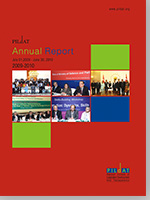The PILDAT Annual Report 2009-2010 covers the period from July 01, 2009 – June 30, 2010. During the year, PILDAT has continued the focus of its activities upon review of the public policies relating to vital issues the society has been facing. The subjects of concern were deliberated well in detail by the experts and professionals in the relevant field in a transparent manner so that everybody could benefit from the discussions and opinions so expressed and so formulated.
PILDAT formed a Democracy Assessment Group to carry out an objective assessment of the performance of democracy in Pakistan using an international framework. The objectives of democracy assessment are that since democracy is restored in Pakistan, the society must strive to improve and strengthen it. It is a collective responsibility of all segments of the society that democracy must deliver and succeed because the poor quality of democracy may disappoint people, lead to yet another failure and derailment of democracy. The PILDAT’s initiative is an effor t to make democracy deliver and work. The assessment process is a tool to promote democratic reform. It is not meant just to assess the Government alone but assess the entire society. The PILDAT Democracy Assessment initiative does not end at commentary or analysis, the process is directed at identifying and lobbying for reforms using the collective influence for strengthening the democracy. The initiative seeks to open a dialogue with the government before any reforms are made public and enforced, the government should hear the other side and incorporate their valuable proposals so that an ownership could be established on the reform agenda by the entire society.
PILDAT continues working together with veteran Parliamentarians across parties, including the current legislative and executive leadership, to improve the Parliamentary functioning, particularly with reference to civil- military relations, oversight of the security and defense sector and to take charge of the budget scrutiny by effectively activating the Parliamentary Committees. The Parliamentary Committees can contribute in this regard by meaningful input, control, scrutiny and oversight of the processes by the public representatives. These Committees should endeavor for promotion of constitutionalism and rule of law.
The PILDAT’s Citizens Group on Electoral Process (CGEP) presented the proposals on required Electoral Reforms in Pakistan to the Prime Minister of Pakistan, Syed Yusuf Raza Gilani and Justice (Retd.) Hamid Ali Mirza, Chief Election Commissioner of Pakistan. The Prime Minister assured the CGEP of the consideration of all electoral reform proposals. The CGEP believes Electoral Reforms require changes in laws, rules and practices and therefore meaningful reform can only be brought in at this stage. Three key reform proposals of CGEP have been made part of the Constitution through the 18th Constitutional Amendment including the process of appointment of the Chief Election Commissioner, composition of the Election Commission and Caretaker Governments.
The Ministry of Narcotics Control, Government of Pakistan, sought the cooperation of PILDAT in involving various segments of the society in reviewing the Draft National Anti-Narcotics Policy 2010, proposed to be announced by the Ministry, and giving feedback before its finalization to consider and incorporate the collected feedbacks in the final version of the policy. This was the first time that a Federal Government Ministry sought input from the civil society on a draft national policy prior to its announcement. This goes to the credit of the PILDAT that such a contribution was sought through it. PILDAT involved the broader Pakistani society including parliamentarians, politicians, media, administrative services of the Government of Pakistan and Provincial Governments, civil society organizations, opinion-leaders, intellectuals and the youth in re-shaping the new Anti- Narcotics Policy. The consultations thus organised also helped in raising public awareness about the menace of narcotics- trafficking and its nexus with organised crime especially the violence and terrorism.
During the year, PILDAT was instrumental in organizing study visits of parliamentarians, opinion makers, intellectuals, academia and other experts to Turkey and UK. These visits were arranged essentially to learn from others experiences particularly in the fields of civil military relations, deepening and sustaining democracy, handling conflict ridden situations, strengthening accountability in political process and other related areas.








